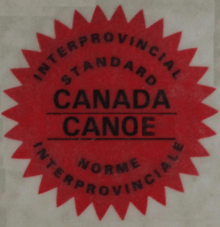Interprovincial Standards

The Red Seal Interprovincial Standards Program, also known as Red Seal or simply IP, is a set of trade qualifications in Canada, jointly administered by the Federal, Provincial and Territorial governments. The program has run since 1959.[1]
The 1995 Agreement on Internal Trade, agreed upon by all provinces except Nunavut, states that each party to the agreement will provide automatic recognition and free access to all workers holding an inter-provincial standards (Red Seal) program qualification.[2]
Although there is a federal agreement, each province implements the program with its own legislation: (Note that these are all Provincial Acts. The regulation associated with each of these acts typically identify which trades are considered compulsory trades).
- Prince Edward Island's Journeyman program is regulated by the Apprenticeship and Trades Qualification Act[3]
- Nova Scotia's Journeyman program is regulated by the Apprenticeship and Trades Qualification Act[4]
- Newfoundland's Journeyman program is regulated by the Apprenticeship and Certification Act[5]
- New Brunswick's Journeyman program is regulated by the Apprenticeship and Occupational Certification Act [6]
- Quebec's Journeyman program is regulated by the Manpower Vocational Training and Qualification Act[7]
- Ontario 's Journeyman program is regulated by the Ontario College of Trades and Apprenticeship Act.[8] Uniquely, it mandated the creation of the Ontario College of Trades to regulate and promote the trades in Ontario.
- Manitoba's Journeyman program is regulated by the Apprenticeship and Certification act.[9]
- Saskatchewan's Journeyman program is regulated by the Apprenticeship and Trade Certification Act[10]
- Alberta's Journeyman program is regulated by the Apprenticeship and Industry Training Act[11]
- British Columbia's Journeyman program is regulated by the Industry Training Authority Act[12]
- Nunavut's Journeyman program is regulated by the Trade and Occupations Certification Act[13]
- The Yukon Territories' Journeyman program is regulated by the Apprenticeship Training Act[14]
- The Northwest Territories' Journeyman program is regulated by the Apprenticeship, Trade, and Occupation Certification Act[15]
Recipients receive a "Certificate of Qualification", and are entitled to use the "RSE" post-nominal.[16] [17]
With Red Seal endorsement of their apprenticeship training, certain skilled trades workers are qualified to work in all provinces and territories without further examination. For example, someone who passes the Red Seal Cook Exam is given the government recognised designation of "Red Seal Cook" which is a recognized qualification in every province and territory. There are 56[18] trades currently recognized under the program, covering such trades as cook, electrician, machinist, welder, heavy equipment operator, millwright, and roofer.
Many employers only hire persons with this qualification to avoid varying standards amongst the provinces,[19] or the company does work in more than one province. Some employers may hire a person with a provincial TQ (trade qualification) over someone with an IP because they feel that the training and education are of a higher standard in that province than the IP. Most employers accept both equally.[20]
Some trades are designated under provincial legislation as compulsory trades, meaning all individuals who practise the trade must be certified or be working toward certification to work legally, with some exceptions.[21]
Some trades do not contain any restricted skill sets, and thus certification is optional. For example, in Ontario the Instrumentation and Control apprenticeship program does not contain any restricted skill sets as per Ontario Regulation 565/99, Restricted skill sets. This means that a worker does not need a certificate of apprenticeship or a certificate of qualification to practice the trade.[22] These trades are called Voluntary trades.
By contrast, some trades do contain restricted skill sets, and people may not practice a trade without either a Certificate of Qualification or a Certificate of Apprenticeship. For example, in Ontario one cannot be a construction & maintenance electrician, a hairstylist, or a sheet metal worker without a certification or apprenticeship[23]
References
- ↑ retrieved 2012 March 13
- ↑ http://www.ait-aci.ca/en/ait/AIT%20Original%20with%20signatures.pdf 1995 agreement on Internal Trade
- ↑ http://www.canlii.org/en/pe/laws/stat/rspei-1988-c-a-15.2/latest/rspei-1988-c-a-15.2.html Apprenticeship and Trades Qualification Act
- ↑ http://www.novascotia.ca/just/regulations/regs/atqgenrl.htm Apprenticeship and Trades Qualification Act
- ↑ http://www.canlii.org/en/nl/laws/stat/snl-1999-c-a-12.1/latest/snl-1999-c-a-12.1.html Apprenticeship and Certification Act
- ↑ http://www.gnb.ca/legis/bill/FILE/57/2/Bill-43-e.htm Apprenticeship and Occupational Certification Act
- ↑ http://www.canlii.org/en/qc/laws/stat/rsq-c-f-5/latest/rsq-c-f-5.html Manpower Vocational Training and Qualification Act
- ↑ http://www.e-laws.gov.on.ca/html/statutes/english/elaws_statutes_09o22_e.htm#BK4 Ontario College of Trades act
- ↑ https://web2.gov.mb.ca/laws/statutes/ccsm/a110e.php Apprenticeship and Certification act
- ↑ http://www.qp.gov.sk.ca/documents/English/Statutes/Statutes/A22-2.pdf Apprenticeship and Trade Certification Act
- ↑ http://www.qp.alberta.ca/documents/Acts/A42.pdf Apprenticeship and Industry Training Act
- ↑ http://www.bclaws.ca/civix/document/id/complete/statreg/03034_01 Industry Training Authority Act
- ↑ http://www.justice.gov.nt.ca/pdf/acts/apprent_trade_occ_cert.pdf Trade and Occupations Certification Act
- ↑ http://www.canlii.org/en/pe/laws/stat/rspei-1988-c-a-15.2/latest/rspei-1988-c-a-15.2.html Apprenticeship Training Act
- ↑ http://www.justice.gov.nt.ca/pdf/acts/apprent_trade_occ_cert.pdf Apprenticeship, Trade, and Occupation Certification Act
- ↑ http://www.red-seal.ca/[email protected]?cid=22
- ↑ http://www.red-seal.ca/about/[email protected]
- ↑ "http://www.red-seal.ca/about/pr.4gr.1m-eng.html". Red Seal Program. June 6, 2016. External link in
|title=(help) - ↑ http://www.red-seal.ca/[email protected]?cid=28
- ↑ http://www.red-seal.ca/[email protected]?cid=26
- ↑ http://www.collegeoftrades.ca/trades-in-ontario
- ↑ Apprenticeship Training Standard Instrumentation and Control Technician, Ontario Ministry of Colleges and Universities, ISBN 978-1-4435-3272-3, page 3
- ↑ http://www.collegeoftrades.ca/about/trades-in-ontario list Trades in Ontario